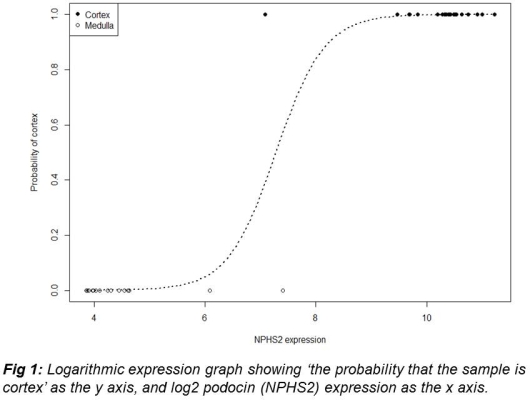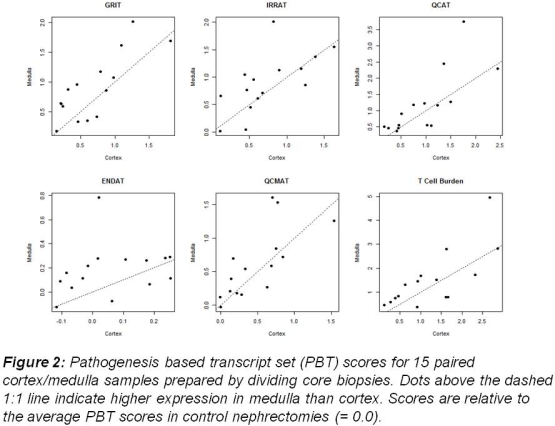Molecular Assessment of Kidney Transplant Biopsies Performs Similarly in Medulla and Cortex.
1Alberta Transplant Applied Genomics Center, Edmonton, AB, Canada
2Department of Nephrology and Dialysis, Medical University of Vienna, Vienna, Austria
3Department of Medicine, Division of Nephrology and Transplant Immunology, University of Alberta, Edmonton, AB, Canada.
Meeting: 2016 American Transplant Congress
Abstract number: 28
Keywords: Gene expression, Genomics, Kidney transplantation
Session Information
Session Name: Concurrent Session: Kidney Acute Cellular Rejection: Clinical Outcomes and Pathological Characteristics
Session Type: Concurrent Session
Date: Sunday, June 12, 2016
Session Time: 2:30pm-4:00pm
 Presentation Time: 2:42pm-2:54pm
Presentation Time: 2:42pm-2:54pm
Location: Ballroom C
Histologic assessment of kidney biopsies is usually unable to interpret medulla, but molecular changes associated with rejection likely occur in both medulla and cortex. Analysis of a biopsy core by microarray technology must consider that assessment may be affected by a biopsy that is partially or completely medulla. We demonstrated that the expression of NPHS2 (podocin), a glomerular podocyte specific transcript, reflected the percent of cortex in biopsies assessed by microarrays (see Figure 1): in biopsies with either pure cortex or pure medulla, podocin is exclusively expressed in cortex. In the Molecular Microscope system, this allows us to estimate the percentage of a biopsy that is cortex.

We then divided 15 biopsies into cortex and medulla, and compared their gene expression measurements. Figure 2 shows that there was close agreement between cortex and medulla in terms of expression of pathogenesis-based transcript sets. interferon gamma inducible transcripts (GRIT1); injury induced transcripts (IRRAT); T cell transcripts (QCAT); endothelial transcripts (ENDAT); macrophage burden (QCMAT); and T cell burden. Diagnostic equations also performed similarly in the 15 pairs.
We conclude: 1. NPHS2 expression estimates the percent cortex for molecular biopsy assessment; 2. medulla and cortex have similar molecular signals for rejection and injury; 3. molecular diagnoses can be determined in medulla and cortex using the same equations, although the actual agreement will need to be calibrated to determine how the percent cortex actually affects the diagnostic readouts.

CITATION INFORMATION: Madill-Thomsen K, Reeve J, Bohmig G, Eskandary F, Halloran P. Molecular Assessment of Kidney Transplant Biopsies Performs Similarly in Medulla and Cortex. Am J Transplant. 2016;16 (suppl 3).
To cite this abstract in AMA style:
Madill-Thomsen K, Reeve J, Bohmig G, Eskandary F, Halloran P. Molecular Assessment of Kidney Transplant Biopsies Performs Similarly in Medulla and Cortex. [abstract]. Am J Transplant. 2016; 16 (suppl 3). https://atcmeetingabstracts.com/abstract/molecular-assessment-of-kidney-transplant-biopsies-performs-similarly-in-medulla-and-cortex/. Accessed March 3, 2026.« Back to 2016 American Transplant Congress
